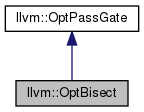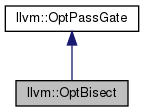This class implements a mechanism to disable passes and individual optimizations at compile time based on a command line option (-opt-bisect-limit) in order to perform a bisecting search for optimization-related problems. More...
#include "llvm/IR/OptBisect.h"


Public Member Functions | |
| OptBisect () | |
| Default constructor, initializes the OptBisect state based on the -opt-bisect-limit command line argument. More... | |
| virtual | ~OptBisect ()=default |
| bool | shouldRunPass (const Pass *P, const Module &U) override |
| Checks the bisect limit to determine if the specified pass should run. More... | |
| bool | shouldRunPass (const Pass *P, const Function &U) override |
| bool | shouldRunPass (const Pass *P, const BasicBlock &U) override |
| bool | shouldRunPass (const Pass *P, const Region &U) override |
| bool | shouldRunPass (const Pass *P, const Loop &U) override |
| bool | shouldRunPass (const Pass *P, const CallGraphSCC &U) override |
 Public Member Functions inherited from llvm::OptPassGate Public Member Functions inherited from llvm::OptPassGate | |
| virtual | ~OptPassGate ()=default |
Detailed Description
This class implements a mechanism to disable passes and individual optimizations at compile time based on a command line option (-opt-bisect-limit) in order to perform a bisecting search for optimization-related problems.
Definition at line 48 of file OptBisect.h.
Constructor & Destructor Documentation
◆ OptBisect()
| OptBisect::OptBisect | ( | ) |
Default constructor, initializes the OptBisect state based on the -opt-bisect-limit command line argument.
By default, bisection is disabled.
Clients should not instantiate this class directly. All access should go through LLVMContext.
Definition at line 39 of file OptBisect.cpp.
References llvm::max(), and OptBisectLimit.
◆ ~OptBisect()
|
virtualdefault |
Member Function Documentation
◆ shouldRunPass() [1/6]
Checks the bisect limit to determine if the specified pass should run.
These functions immediately return true if bisection is disabled. If the bisect limit is set to -1, the functions print a message describing the pass and the bisect number assigned to it and return true. Otherwise, the functions print a message with the bisect number assigned to the pass and indicating whether or not the pass will be run and return true if the bisect limit has not yet been exceeded or false if it has.
Most passes should not call these routines directly. Instead, they are called through helper routines provided by the pass base classes. For instance, function passes should call FunctionPass::skipFunction().
Reimplemented from llvm::OptPassGate.
Definition at line 95 of file OptBisect.cpp.
References getDescription(), and llvm::Pass::getPassName().
◆ shouldRunPass() [2/6]
Reimplemented from llvm::OptPassGate.
Definition at line 99 of file OptBisect.cpp.
References getDescription(), and llvm::Pass::getPassName().
◆ shouldRunPass() [3/6]
|
overridevirtual |
Reimplemented from llvm::OptPassGate.
Definition at line 103 of file OptBisect.cpp.
References getDescription(), and llvm::Pass::getPassName().
◆ shouldRunPass() [4/6]
Reimplemented from llvm::OptPassGate.
Definition at line 107 of file OptBisect.cpp.
References getDescription(), and llvm::Pass::getPassName().
◆ shouldRunPass() [5/6]
Reimplemented from llvm::OptPassGate.
Definition at line 111 of file OptBisect.cpp.
References getDescription(), and llvm::Pass::getPassName().
◆ shouldRunPass() [6/6]
|
overridevirtual |
Reimplemented from llvm::OptPassGate.
Definition at line 115 of file OptBisect.cpp.
References assert(), getDescription(), llvm::Pass::getPassName(), OptBisectLimit, and printPassMessage().
The documentation for this class was generated from the following files:
- include/llvm/IR/OptBisect.h
- lib/IR/OptBisect.cpp
 1.8.13
1.8.13